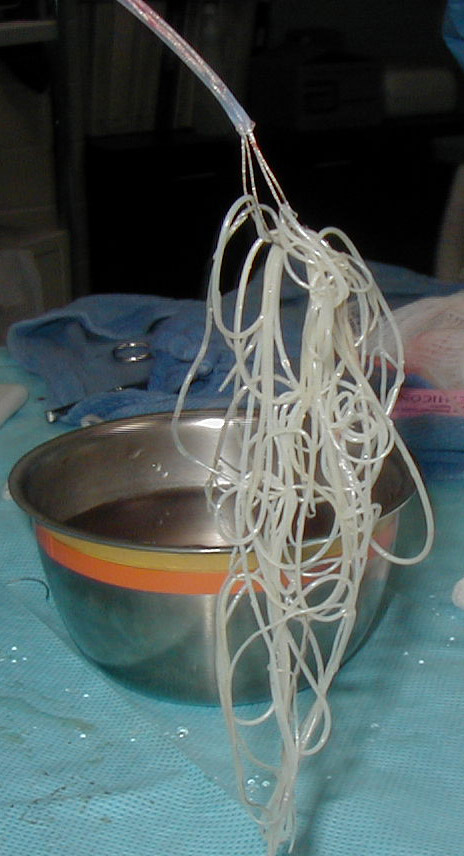
 Heartworm preventative is absolutely essential for any dog in this part of the country. Heartworms are carried and transmitted by mosquitoes. If your home is plagued by mosquitoes, you’ll want to create a safer environment for your dog to avoid this sort of thing happening to them. Therefore, you may want to consider pest control services near you, like these – https://www.pestcontrolexperts.com/local/idaho/nampa/. Growing up to a length of 16 inches, these worms multiply and float through the dog’s circulatory system and lodge in the heart, blocking the normal flow of blood and eventually causing heart failure. Once your dog gets heartworms, there are only two alternatives: You must either treat him for the heartworms or put him to sleep, because, without treatment, he will most likely die.
Heartworm preventative is absolutely essential for any dog in this part of the country. Heartworms are carried and transmitted by mosquitoes. If your home is plagued by mosquitoes, you’ll want to create a safer environment for your dog to avoid this sort of thing happening to them. Therefore, you may want to consider pest control services near you, like these – https://www.pestcontrolexperts.com/local/idaho/nampa/. Growing up to a length of 16 inches, these worms multiply and float through the dog’s circulatory system and lodge in the heart, blocking the normal flow of blood and eventually causing heart failure. Once your dog gets heartworms, there are only two alternatives: You must either treat him for the heartworms or put him to sleep, because, without treatment, he will most likely die.
The heartworms must be killed. There are in practice two methods of heartworm treatment: “fast kill” and “slow kill”.
“Fast kill” is the most recommended. It involves several steps of medications and procedures carried out under the direction of a veterinarian over a lengthy time period. It  is expensive – $1000+ – and very hard on the animal. Depending on your veterinarian’s protocol, the dog is given one to three painful and almost lethal injections of a toxic medication over a period of 60 days in order to kill the heartworms. Recovery is long and difficult. During treatment the dog must be kept quiet, with activity at an absolute minimum, for one month following eachinjection.
is expensive – $1000+ – and very hard on the animal. Depending on your veterinarian’s protocol, the dog is given one to three painful and almost lethal injections of a toxic medication over a period of 60 days in order to kill the heartworms. Recovery is long and difficult. During treatment the dog must be kept quiet, with activity at an absolute minimum, for one month following eachinjection.
Because the expense of “fast kill” is out of reach for many, another option – if the dog is stable and has a very mild case – is to just leave it on an ivermectin-based preventative, a treatment referred to as “slow kill.” However, the dog may remain heartworm positive for two years or more, during which time the damage to the animal continues to progress. Yet, it is better than no treatment at all. Recently, however, studies show that this treatment contributes to the development of resistant heartworm strains that cannot be stopped by any known preventatives. For this reason, the Companion Animal Parasite Council has recommended that the “slow kill” protocol NEVER be used, regardless of the state of the patient. It is their belief that the heartworm infection must be resolved definitively and promptly so as to limit the damage to the animal and to preserve the effectiveness of the medications we have. (For a more extensive description of heartworm and its treatment, go to http://www.marvistavet.com/html/body_heartworm_treatment.html.)
 The most common heartworm preventative is a tablet given monthly. There are a number of brands, and they require a prescription and a prior negative heartworm test. See your veterinarian for his/her recommendation.
The most common heartworm preventative is a tablet given monthly. There are a number of brands, and they require a prescription and a prior negative heartworm test. See your veterinarian for his/her recommendation.
Note: There is currently in the news a lot of negative information about the brand Trifexis, a combination flea, tick, and heartworm medication. While no final decisions-pro or con-have yet been reached as to the safety or potential dangers of Trifexis, we feel you should first be aware of the controversy before you elect to use it. Our stance at AAGA is that, until further testing is done and Trifexis is proven absolutely safe, why take the chance of possibly endangering your pet’s health when there are a number of other tried-and-true products out there to choose from.
